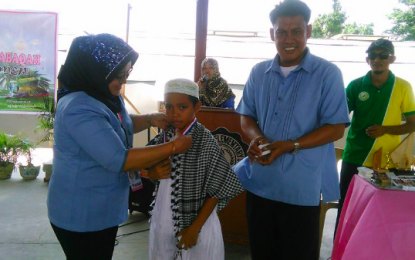
ZAMBOANGA CITY -- Young Muslim learners enrolled in public schools in Zamboanga City are taught Islamic values two days a week and learn the Arabic language in classes held three days a week, where each class session is 40 minutes long.
That's on top of the regular curricular subjects for Kindergarten up to Grade 6, which is prescribed by the Department of Education (DepEd). This means the Arabic Language and Islamic Values Education (ALIVE) program is inculcated in them throughout their long years of schooling.
Hadja Sarah Handang, who started as head of the DepEd's Madrasah Education School Program (MEP) in the city division of schools in 2015, stressed the importance of “educating the heart, not just the mind.”
"Because of the many vices around, we really have to strengthen the spirituality of our children, we have to return to the basic values, like praying before meals," she said.
“The values being promoted by MEP unto the children are for them to be maka-Diyos (pro-God), maka-tao (pro-people), maka-kalikasan (pro-nature), and maka-bayan (pro-country),” Handang said.
There are more than 50,000 Muslim learners enrolled in public elementary schools in the city and all of them are required to take up ALIVE subjects, she said.

These students are found in the 222 public schools, of which 172 are at the elementary level. Of the number, 44 have a minimum of 80 percentile Muslim pupils teach MEP.
“If you follow the ideal ratio of one teacher per 45 students, then we should have 1,000 teachers under MEP, but right now we only have 197,” she said, adding that she has requested for the hiring of 100 ALIVE teachers per year.
According to Handang, an ALIVE teacher does not hold a regular teaching item, and he or she receives a meager PHP6,000 allowance per month.
Before allowed to teach, ALIVE instructors undergo a 25-day enhancement training in ALIVE and English academics, including writing lesson plans.
Once under the program, they can choose to get a two-year scholarship for them to be able to take the teachers' qualifying board exam. If they pass, they would be absorbed as regular item holders and teach other DepEd subjects.
Last year, 28 ALIVE teachers qualified to hold regular teaching positions, according to Handang.

Handang’s duties, she said, revolve around the monitoring of the teaching-learning experience of teachers and students, and addressing deficiencies as they occur.
To further strengthen the program, Handang has initiated the teaching of Arabic language to school principals where ALIVE is integrated. It is necessary, she said, that school principals learn to read Arabic so that they can properly evaluate how well their ALIVE teachers are doing their job.

Five private schools in the city also teach ALIVE subjects, where Handang supervises all of them. ALIVE is considered as madrasah training, but the many madrasahs in the city holding classes on weekends are not under DepEd. They are overseen by the National Commission on Muslim Filipinos.
ALIVE subjects, she said, are not religious in nature, adding that the program aims to remove some notions that madrasahs teach negative and extremist values to their students.
Handang said she has seen many positive behavioral changes among ALIVE students.
They exhibit higher tolerance towards people belonging to other religions, she noted.
In fact, she said, some Christian students who are voluntarily enrolled in ALIVE get better grades than their Muslim classmates. MEP is a model of inclusive education, she said.
"This makes me happy as MEP supervisor, which is my vocation as a Muslim educator. I learn many things myself that help to prepare me for the next life. No amount of money can as much reward me for doing this kind of job", she declared. (Rey-Luis Banagudos/PNA)
